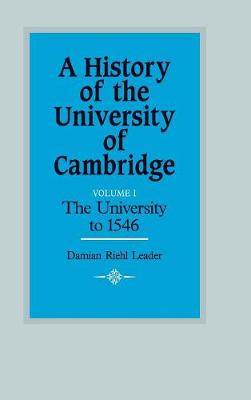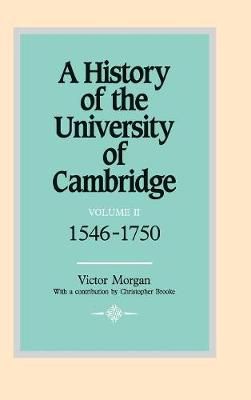History of the University of Cambridge
4 total works
This is the first volume of a four-part History of the University of Cambridge, under the general editorship of Professor C. N. L. Brooke, and the first volume on the medieval university as a whole to be published in over a century. It provides a synthesis of the intellectual, social, political and religious life of the early university, and gives serious attention to the development of classroom studies and how they changed with the coming of the Renaissance and the Reformation. Following the first stirrings in the early thirteenth century, the evolution of the university is traced from the original corporation of masters and scholars through the early development of the colleges. The second half of the book focuses on the century from the 1440s to the 1540s, which saw the flowering of the university under Tudor patronage. In the decades preceding the Reformation many colleges were founded, the teaching structures reorganised and the curriculum made more humanistic. The place of Cambridge at the forefront of northern European universities was eventually assured when Henry VIII founded Trinity College in 1546, in the face of changes and difficulties experienced during the course of the Reformation.
A History of the University of Cambridge 4 Volume Hardback Set
by Damian Riehl Leader, Victor Morgan, Peter Searby, and Christopher Brooke
Published 1 April 2004
This is a fascinating institutional history of the University of Cambridge and its place in the world. Volume I, the first book on the medieval university in over a century, explores the university's intellectual, social, political and religious life and how this changed with the coming of the Renaissance and Reformation. Volume II studies relations between Cambridge and its wider world in the early modern period: the court and church hierarchy; the 'country'; and the wider academic world. Volume III charts the beginnings of its transformation into the University as it exists today: inclusive in its membership, diverse in its curricula, and staffed by committed scholars and teachers. Finally, Volume IV explores the extraordinary growth in size and academic stature of the University between 1870 and 1990. This is a vital contribution to the history not only of one major university, but of the academic societies of Europe in general.
Cambridge in the eighteenth and nineteenth centuries was a place of sharp contrasts. At one extreme a gifted minority studied mathematics intensively for the Tripos, the honours degree. At the other, most undergraduates faced meagre academic demands and might idle their time away. The dons, the fellows of the colleges that constituted the University, were chosen for their Tripos performance and included scholars of international reputation such as Whewell and Sidgwick, but also men who treated their fellowships as sinecures. A pillar of the Church of England that denied membership to non-Anglicans, the University functioned largely as a seminary, while teaching more mathematics than theology. This volume describes the complex institution of the University, and also the beginnings of its transformation after 1850 - under the pressure of public opinion and the State - into the University as it exists today: inclusive in its membership, diverse in its curricula, and staffed by committed scholars and teachers.
This volume brings to completion the four-volume A History of the University of Cambridge, and is a vital contribution to the history not only of one major university, but of the academic societies of early modern Europe in general. Its main author, Victor Morgan, has made a special study of the relations between Cambridge and its wider world: the court and church hierarchy which sought to control it in the aftermath of the Reformation; the 'country', that is the provincial gentry; and the wider academic world. Morgan also finds the seeds of contemporary problems of university governance in the struggles which led to and followed the new Elizabethan Statutes of 1570. Christopher Brooke, General Editor and part-author, has contributed chapters on architectural history and among other themes a study of the intellectual giants of the late seventeenth and early eighteenth centuries.


